

Investor's Corner
Tesla board backs Elon Musk as he faces the ‘most painful’ year of his career
Elon Musk is known for managing multiple companies, but even those who have the gift of multitasking have a limit. Amidst the fallout of his tweets about having funding secured for Tesla’s possible privatization, Elon Musk is starting to feel a little burned out.
The Tesla and SpaceX CEO recently opened up in an interview with the New York Times. The publication noted that during the hourlong session, Musk acknowledged that he was getting exhausted, and that the past year had been incredibly difficult. Musk also admitted that the exhaustion, partly caused by 120-hour work weeks, was starting to take a toll on his physical health.
“This past year has been the most difficult and painful year of my career. It was excruciating. It’s not been great, actually. I’ve had friends come by who are really concerned. There were times when I didn’t leave the factory for three or four days — days when I didn’t go outside. This has really come at the expense of seeing my kids. And seeing friends,” he said.
Much like Tesla’s struggles with the Model 3 production ramp, a lot of the pressure Musk is currently feeling is caused by self-imposed goals. Elon Musk became Elon Musk due to his grit and determination, and he is never one to give up when faced with a seemingly insurmountable challenge. Musk’s relentless nature is one of the core reasons why SpaceX is currently working to conduct crewed demonstration flights of its Crew Dragon spacecraft as early as April 2019, and why the Model 3 is starting to make its presence known in the US auto market.

Jim Ambras, VP product development at Zip2, the first company that Elon and his brother, Kimbal, founded, recalls the insane amount of drive that fuels Musk. In a recent statement to WIRED, Ambras described how Musk would sleep on a bean bag close to his computer just to get work done. The former Zip2 executive also narrated that at one time, the Zip2 team invited Musk to go mountain biking. Unfortunately, the trail proved to be far more challenging than the team expected, even causing Elon’s athletic cousin Russ Rive to get sick when he reached the mountain’s top. Musk, who was not in any way conditioned to undertake such a physical task, was the last one to the summit. Musk finished the climb, but he pushed himself past his limits to do so.
“We’re all at the top waiting for him. We just assumed he turned around and went home. Then we see him coming up around the turn, and he was just completely red. Beet-red. He was riding his bike, he wasn’t walking his bike, and it was just clear that he was killing himself. He just looked like he was torturing himself,” Ambras said.
Well into 2018, Elon Musk is still doing much of the same thing. His hyper-aggressive targets for the Model 3, for one, ultimately caused delays in the vehicle’s production. Being a publicly-traded company, Tesla stock (NASDAQ:TSLA) felt these effects. Today, Tesla shares are known for their wild swings and overall volatility, as well as their penchant for attracting passionate short-sellers. Tesla is currently the most-shorted stock in the market, with more than 30 million shares being sold short. Musk has been affected by short-sellers’ activities, and in his recent interview with the NYT, he admitted that people betting against the company are giving him a lot of stress. Musk even noted that he expects the next few months to be even more difficult, as attacks against Tesla would likely increase.
“(I am) bracing for at least a few months of extreme torture from the short-sellers, who are desperately pushing a narrative that will possibly result in Tesla’s destruction. They’re not dumb guys, but they’re not supersmart. They’re O.K. They’re smartish,” Musk said.

True to Musk’s own predictions, the attacks against Tesla had only increased since talks about the company’s privatization emerged. Musk is currently facing an investigation from the SEC about his tweets, and reports from several media outlets suggest that Tesla’s board is trying to do damage control. In response to some of these reports, Tesla’s board issued a statement to the NYT expressing its full support for the embattled CEO.
“There have been many false and irresponsible rumors in the press about the discussions of the Tesla board. We would like to make clear that Elon’s commitment and dedication to Tesla is obvious. Over the past 15 years, Elon’s leadership of the Tesla team has caused Tesla to grow from a small start-up to having hundreds of thousands of cars on the road that customers love, employing tens of thousands of people around the world, and creating significant shareholder value in the process.”
For now, reports are emerging that Tesla is looking for a Chief Operating Officer that can support Elon Musk’s workload. SpaceX, after all, is pretty much working like a well-oiled machine, and a lot of it is due to the work and efforts of Gwynne Shotwell, the COO and President of the private space firm. Musk stated that to the best of his knowledge, there is no active search for a Tesla COO, though he did admit that a couple of years ago, the company approached Sheryl Sandberg, the second-highest executive of Facebook, about the position. Rounding out his recent interview, Elon Musk stated that he has no plans to let go of his position as Tesla’s CEO and Chairman, but he did state that if there is anyone that can “do a better job,” he is very much willing to hand over the reins of the company.
“If you have anyone who can do a better job, please let me know. They can have the job. Is there someone who can do the job better? They can have the reins right now,” Musk said.

Elon Musk
SpaceX IPO could push Elon Musk’s net worth past $1 trillion: Polymarket
The estimates were shared by the official Polymarket Money account on social media platform X.

Recent projections have outlined how a potential $1.75 trillion SpaceX IPO could generate historic returns for early investors. The projections suggest the offering would not only become the largest IPO in history but could also result in unprecedented windfalls for some of the company’s key investors.
The estimates were shared by the official Polymarket Money account on social media platform X.
As noted in a Polymarket Money analysis, Elon Musk invested $100 million into SpaceX in 2002 and currently owns approximately 42% of the company. At a $1.75 trillion valuation following SpaceX’s potential $1.75 trillion IPO, that stake would be worth roughly $735 billion.
Such a figure would dramatically expand Musk’s net worth. When combined with his holdings in Tesla Inc. and other ventures, a public debut at that level could position him as the world’s first trillionaire, depending on market conditions at the time of listing.
The Bloomberg Billionaires Index currently lists Elon Musk with a net worth of $666 billion, though a notable portion of this is tied to his TSLA stock. Tesla currently holds a market cap of $1.51 trillion, and Elon Musk’s currently holds about 13% to 15% of the company’s outstanding common stock.
Founders Fund, co-founded by Peter Thiel, invested $20 million in SpaceX in 2008. Polymarket Money estimates the firm owns between 1.5% and 3% of the private space company. At a $1.75 trillion valuation, that range would translate to approximately $26.25 billion to $52.5 billion in value.
That return would represent one of the most significant venture capital outcomes in modern Silicon Valley history, with a growth of 131,150% to 262,400%.
Alphabet Inc., Google’s parent company, invested $900 million into SpaceX in 2015 and is estimated to hold between 6% and 7% of the private space firm. At the projected IPO valuation, that stake could be worth between $105 billion and $122.5 billion. That’s a growth of 11,566% to 14,455%.
Other major backers highlighted in the post include Fidelity Investments, Baillie Gifford, Valor Equity Partners, Bank of America, and Andreessen Horowitz, each potentially sitting on multibillion-dollar gains.
Elon Musk
Elon Musk hints Tesla investors will be rewarded heavily
“Hold onto your Tesla stock. It’s going to be worth a lot, I think. That’s my bet,” Musk said.

Elon Musk recently hinted that he believes Tesla investors will be rewarded heavily if they continue to hold onto their shares, and he reiterated that in a new interview that the company released on its social accounts this week.
Musk is one of the most successful CEOs in the modern era and has mammothed competitors on the Forbes Net Worth List over the past year as his holdings in his various companies have continued to swell.
Tesla investors, especially those who have been holding shares for several years, have also felt substantial gains in their portfolios. Over the past five years, the stock is up over 78 percent. Since February 2019, nearly seven years ago to the day, the stock is up over 1,800 percent.
Musk said in the interview:
“Hold onto your Tesla stock. It’s going to be worth a lot, I think. That’s my bet.”
Elon Musk in new interview: “Hold on to your $TSLA stock. It’s going to be worth a lot, I think. That’s my bet.” pic.twitter.com/cucirBuhq0
— Sawyer Merritt (@SawyerMerritt) February 26, 2026
It’s no secret Musk has been extremely bullish on his own companies, but Tesla in particular, because it is publicly traded.
However, the company has so many amazing projects that have an opportunity to revolutionize their respective industries. There is certainly a path to major growth on Wall Street for Tesla through its various future projects, including Optimus, Cybercab, Semi, and Unsupervised FSD.
- Optimus (Tesla’s humanoid robot): Musk has discussed its potential for tasks like childcare, walking dogs, or assisting elderly parents, positioning it as a massive long-term driver of company value.
- Cybercab (Tesla’s robotaxi/autonomous ride-hailing vehicle): a fully autonomous vehicle geared specifically for Tesla’s ride-sharing ambitions.
- Semi (Tesla’s electric truck, with mentions of expansion, like in Europe): brings Tesla into the commercial logistics sector.
- Unsupervised FSD (Full Self-Driving software achieving full autonomy without human supervision): turns every Tesla owner’s vehicle into a fully-autonomous vehicle upon release
These projects specifically are some of the highest-growth pillars Tesla has ever attempted to develop, especially in Musk’s eyes, as he has said Optimus will be the best-selling product of all-time.
Many analysts agree, but the bullish ones, like Cathie Wood of ARK Invest, are perhaps the one who believes Tesla has incredible potential on Wall Street, predicting a $2,600 price target for 2030, but this is not even including Optimus.
She told Bloomberg last March that she believes that the project will present a potential additive if Tesla can scale faster than anticipated.
Elon Musk
Tesla stock gets latest synopsis from Jim Cramer: ‘It’s actually a robotics company’
“Turns out it’s actually a robotics and Cybercab company, and I want to buy, buy, buy. Yes, Tesla’s the paper that turned into scissors in one session,” Cramer said.

Tesla stock (NASDAQ: TSLA) got its latest synopsis from Wall Street analyst Jim Cramer, who finally realized something that many fans of the company have known all along: it’s not a car company. Instead, it’s a robotics company.
In a recent note that was released after Tesla reported Earnings in late January, Cramer seemed to recognize that the underwhelming financials and overall performance of the automotive division were not representative of the current state of affairs.
Instead, we’re seeing a company transition itself away from its early identity, essentially evolving like a caterpillar into a butterfly.
The narrative of the Earnings Call was simple: We’re not a car company, at least not from a birds-eye view. We’re an AI and Robotics company, and we are transitioning to this quicker than most people realize.
Tesla stock gets another analysis from Jim Cramer, and investors will like it
Tesla’s Q4 Earnings Call featured plenty of analysis from CEO Elon Musk and others, and some of the more minor details of the call were even indicative of a company that is moving toward AI instead of its cars. For example, the Model S and Model X will be no more after Q2, as Musk said that they serve relatively no purpose for the future.
Instead, Tesla is shifting its focus to the vehicles catered for autonomy and its Robotaxi and self-driving efforts.
Cramer recognizes this:
“…we got results from Tesla, which actually beat numbers, but nobody cares about the numbers here, as electric vehicles are the past. And according to CEO Elon Musk, the future of this company comes down to Cybercabs and humanoid robots. Stock fell more than 3% the next day. That may be because their capital expenditures budget was higher than expected, or maybe people wanted more details from the new businesses. At this point, I think Musk acolytes might be more excited about SpaceX, which is planning to come public later this year.”
He continued, highlighting the company’s true transition away from vehicles to its Cybercab, Optimus, and AI ambitions:
“I know it’s hard to believe how quickly this market can change its attitude. Last night, I heard a disastrous car company speak. Turns out it’s actually a robotics and Cybercab company, and I want to buy, buy, buy. Yes, Tesla’s the paper that turned into scissors in one session. I didn’t like it as a car company. Boy, I love it as a Cybercab and humanoid robot juggernaut. Call me a buyer and give me five robots while I’m at it.”
Cramer’s narrative seems to fit that of the most bullish Tesla investors. Anyone who is labeled a “permabull” has been echoing a similar sentiment over the past several years: Tesla is not a car company any longer.
Instead, the true focus is on the future and the potential that AI and Robotics bring to the company. It is truly difficult to put Tesla shares in the same group as companies like Ford, General Motors, and others.
Tesla shares are down less than half a percent at the time of publishing, trading at $423.69.








